Welcome to the bi-annual update for The Animation History Bibliography!
It’s been a busy and exciting seven months, both for me and the Bibliography itself. Thanks to your helpful suggestions, the compendium of media with a focus on Animation History has grown by leaps and bounds! Let me catch you up on what’s changed, what new media has been added, and ask you, “What’s in a name?”
The Bibliography has grown to cover over 3,175 books (This count includes reprints/second editions and beyond). There is also a new and useful index spreadsheet summarizing the entire Bibliography in a single page. You can use it to quickly check to see if a title is listed or not at a glance or find books by the same author.
Since the original launch back in March, the addition of several subcategories has been necessary to make things easier to read and to organize. The biggest and newest Categories cover the Disney Theme Parks. I plan on adding additional subcategories to cover prominent studios that have a large representation of literature, like Fleischer Studios, in a future update.
Animation hasn’t always had a lot of books written about it. In fact, it really wasn’t until the end of the 1980’s that books on the many subjects of animation began to spring forth exponentially continuing until today. Using what’s in the Bibliography, check out this graph of books published by year:
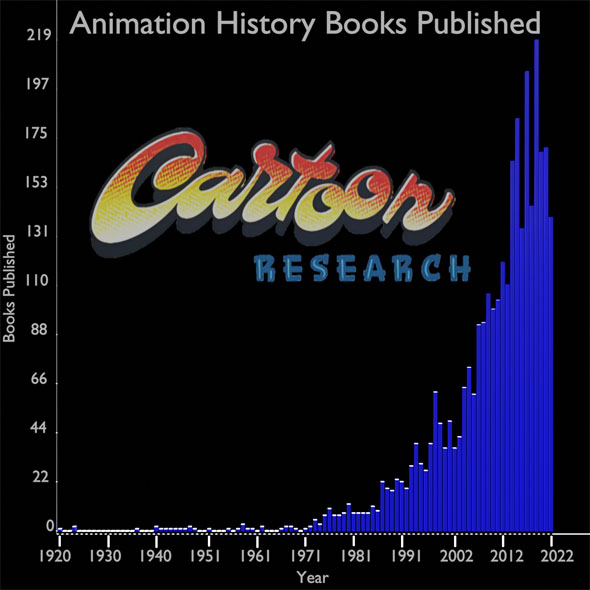
I can’t wait to compare this graph to a timeline of periodicals published over time. I’d be curious what, if any, correlation to book publications might exist. The unfortunate part of that plan is availability. Animation History periodicals are even more challenging to keep track of than books. I’ve been keeping an eye out on second hand options and, luckily, Archive.org exists. Quite a few animation magazines have been uploaded for posterity, and the ones I’ve found are listed in Periodicals.
I implore copyright holders of early periodicals to consider uploading their works to online archives or re-printing for profit. A couple of reasons to consider to do this are for both the historical record and to be enjoyed by those who may not have known (or been around) during their publications. You never know what can be learned from these early publications.
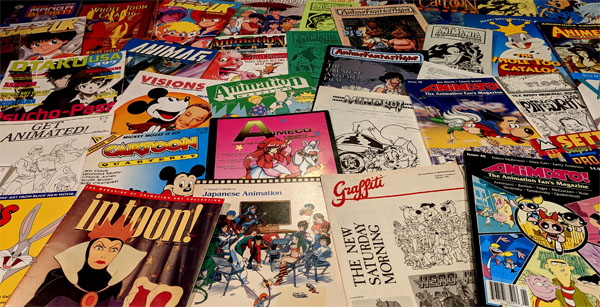
As an example, while researching and scanning my own collection of periodicals, I came across Reg Hartt’s 1980 Cineforum through an in-magazine advertisement. I did a Google search and found that Reg Hartt had uploaded the stellar Friz Freleng interview from that event on his own YouTube channel:
While working on the Bibliography, I burned through all of my music to the point that I never want to listen to most of it again. Thankfully, Animation Podcasts have been a wonder! They’ve been so useful, in fact, that I’ve realized that quite a few subjects that have not had books written on them have, in some cases, many hours focused on that topic in Podcast/Vodcast form. Even better, some of these animation focused podcasts have interviewed first hand the movers and shakers that make this artform function. As such, I’ve added a whole new section of Podcasts and Vodcasts focused on Animation History. No, it does not cover anywhere near the amount of audio out there on the subject, but, like the Bibliography, we’ll get there one step at a time (Feel free to submit any podcasts not yet represented).
Podcast hosts and creators: consider making available transcripts of your respective episodes available. There are some easy and automated processes that can do it for you (mostly) and not just for accessibility, but hosting that information will return you search engine optimizations (marketing!). After all, if new listeners and viewers don’t know the right terms to search for your podcast,like your name or the name of your show, then the topics you cover should show up for more “generic” search results. Knowing the right word to use is important…
I love words! Words matter. Otherwise we wouldn’t have puns and that would be a pun-ishing life to live. However, I’ve been struggling with a word that I would be interested in hearing feedback from my fellow Cartoon Researchers. Since the start, the Animation History Bibliography was labeled a bibliography, but has always contained documentaries and periodicals and now, like the above mentioned, recently added Podcasts and Vodcasts. Technically, that would make this a mediaography, but that does not feel specific enough. Animography is the study of animated typography. So a proposal, what about “animaography”? Root word of animation, anima- “to give life to”, and the suffix -ography, “the study of”. So far the only Google search result leads to my blog post pontificating the possibilities.
animaography (a-ni-ma-o-gra-phy) Noun – the collection and listing of material concerning the study of animation.
Used in a sentence: Orrin Scott will need to add the newest history book on the Disney Renaissance to the animaography.
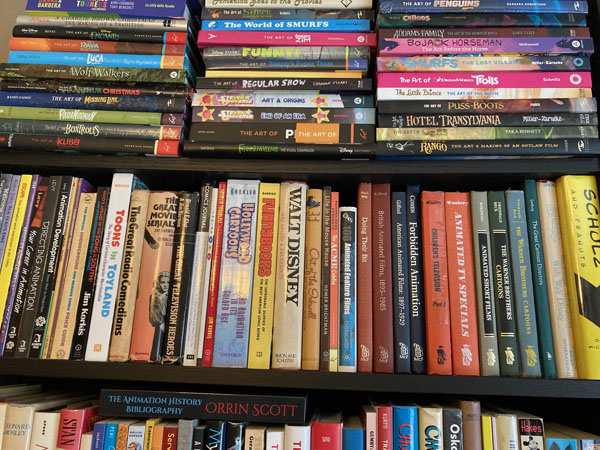
As for me, I cannot tell you how much fun this is! Everyday I’m discovering something new. When I first started putting this bibliography together for an ASIFA meeting a couple years ago, I really thought there would be no more than 100-150 books about animation history, tops. Obviously, I was a bit wrong! The biggest lesson so far has been, you don’t know what you don’t know. And what I don’t know could fill a book (Available here at Amazon.com). Everyday I’m learning more about innovations and individuals that make up the best form of art and entertainment. And best of all, I’m watching amazing animation (and documentaries) I have never seen before!
I’ve recently decided to go back to college to better myself. I want to make awesome stuff! – More additions to the Bibliography, video essays, analysis and other historical works! However, I’ve got to acquire some skills first. Updates to the Bibliography may slow down, but they will always be made public on the Cartoon Research Facebook Group .
Look forward to a Second Edition of the physical copy of the Animation History Bibliography, with perhaps a new title, coming in 2023! The new edition will reflect all the changes from these last seven months and any new updates leading right up to launch. More information soon. As always if you have any suggestions, please submit them here! Until next time, take care of yourself!
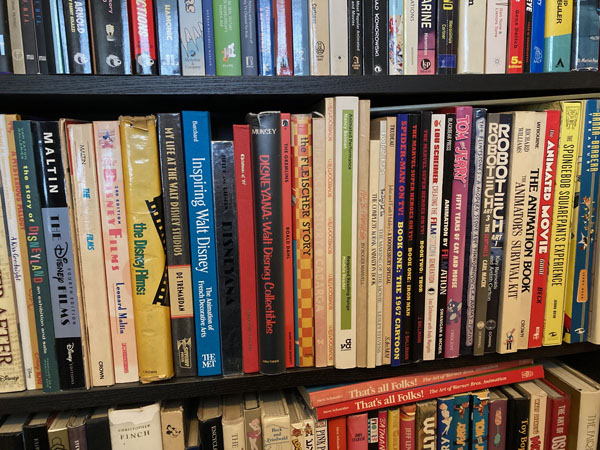


 Orrin Scott is an animation researcher. His research focus has been on how society interacts with animation as a form of communication, commerce, art, and entertainment.
Orrin Scott is an animation researcher. His research focus has been on how society interacts with animation as a form of communication, commerce, art, and entertainment.
























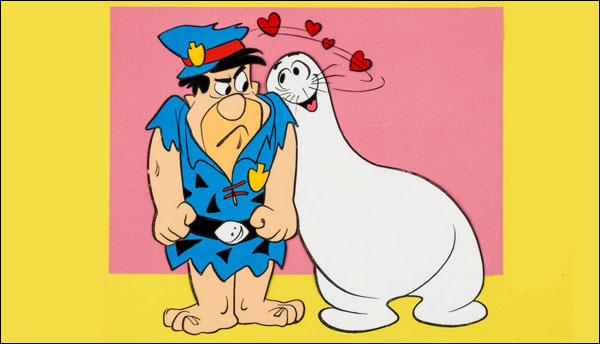
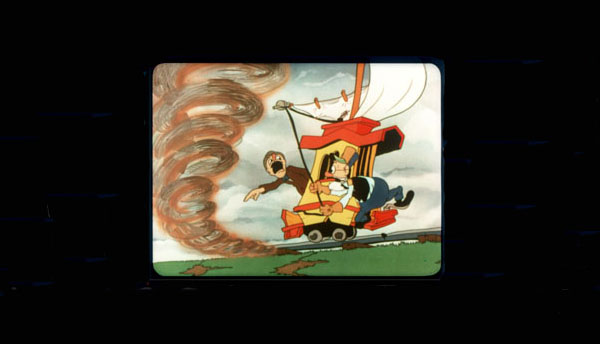














“Animaography” is just plain wrong. The suffix is “-graphy”, not “-ography”, from the Greek grapho, to write. That’s why there’s no “o” in “calligraphy” or “telegraph”. “Mediagraphy” is a legitimate word, a neologism that’s bound to become more familiar as time goes on, so if you want something more comprehensive that a listing of books I recommend calling it the “Animation History Mediagraphy”. One sometimes sees it spelled “mediography”, but technically that would refer to a list of sources in a single medium. It also sounds too much like “mediocrity” for my liking.
Be prepared. I’m writing one!
The most interesting thing about many animation books is how, as pets are said to do, they come to resemble their owners. The books Disney put out about its product are self-congratulatory and utterly professional. Leslie Cabarga’s “The Fleischer Story” is very much like a Fleischer cartoon: good ideas spoiled by poor planning and weak execution, but with an undeniable ramshackle charm. Chuck Jones’ books betray self-conscious cleverness and sophistication. Shamus Culhane’s “Talking Animals and Other People” invites armchair psychology: Culhane knew his business a lot better than he seemed to know himself. The books on Warner Bros. cartoons show why they’re the most generally satisfying as a body of work.
One book I don’t see in the photos above is Stefan Kanfer’s “Serious Business,” which I found at the Strand in New York years ago, and is a definite asset to any animaven’s collection.
Honestly, I thought “The Fleischer Story” was well-done. I don’t get the recent hatred of this book other than more information of the Flieischer has been found since then.
I agree completely on Cabarga’s book. The execution was a little sloppy. I just read and reviewed it: https://buddyscartoons.blogspot.com/p/the-fleischer-story-featuring-betty.html
Warner books are usually too anti-Disney (Schneider’s especially).
I really disagree with all above.
This is such a great resource, Orrin! Thank you so much–my shelves are adequately stocked to get me through the winter, thanks to your hard work!